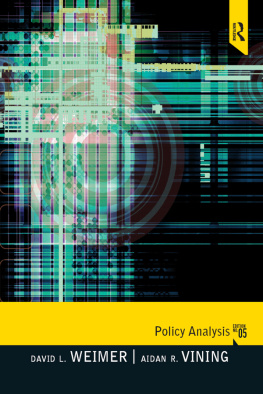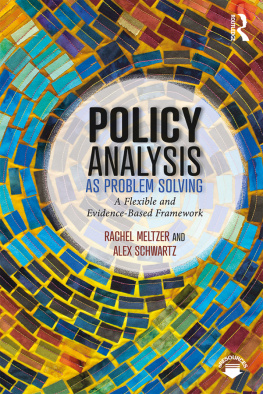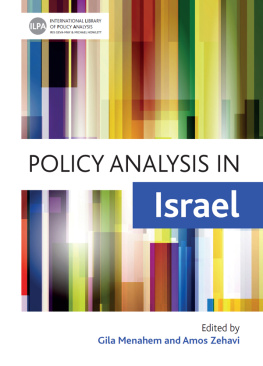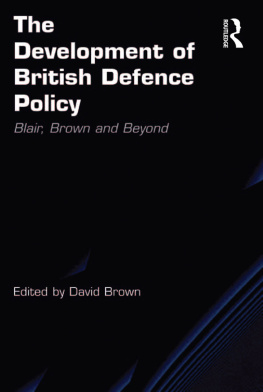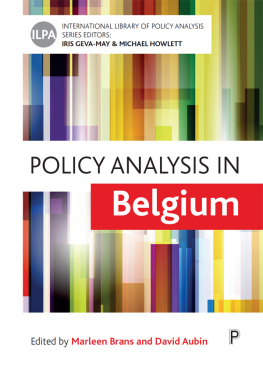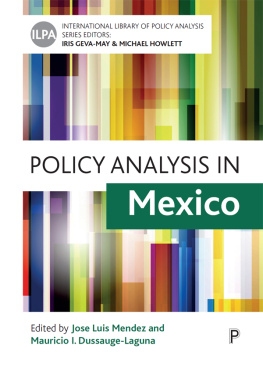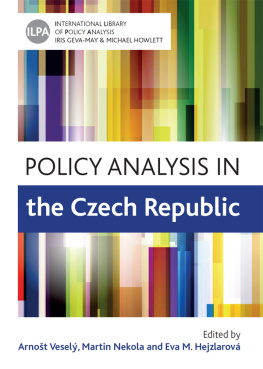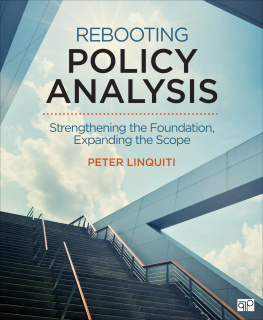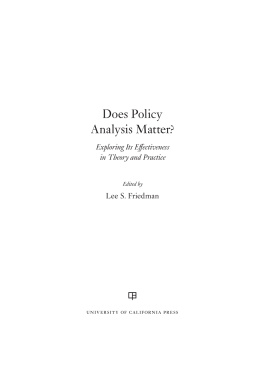Weimer David L. - Policy Analysis
Here you can read online Weimer David L. - Policy Analysis full text of the book (entire story) in english for free. Download pdf and epub, get meaning, cover and reviews about this ebook. publisher: Taylor and Francis, genre: Politics. Description of the work, (preface) as well as reviews are available. Best literature library LitArk.com created for fans of good reading and offers a wide selection of genres:
Romance novel
Science fiction
Adventure
Detective
Science
History
Home and family
Prose
Art
Politics
Computer
Non-fiction
Religion
Business
Children
Humor
Choose a favorite category and find really read worthwhile books. Enjoy immersion in the world of imagination, feel the emotions of the characters or learn something new for yourself, make an fascinating discovery.
- Book:Policy Analysis
- Author:
- Publisher:Taylor and Francis
- Genre:
- Rating:5 / 5
- Favourites:Add to favourites
- Your mark:
- 100
- 1
- 2
- 3
- 4
- 5
Policy Analysis: summary, description and annotation
We offer to read an annotation, description, summary or preface (depends on what the author of the book "Policy Analysis" wrote himself). If you haven't found the necessary information about the book — write in the comments, we will try to find it.
Policy Analysis — read online for free the complete book (whole text) full work
Below is the text of the book, divided by pages. System saving the place of the last page read, allows you to conveniently read the book "Policy Analysis" online for free, without having to search again every time where you left off. Put a bookmark, and you can go to the page where you finished reading at any time.
Font size:
Interval:
Bookmark:
Policy Analysis
Fifth Edition
Policy Analysis:
Concepts and Practice
David L. Weimer
University of Wisconsin-Madison
Aidan R. Vining
Simon Fraser University, Vancouver

First published 2011, 2005, 1999, 1992 by Pearson Education, Inc.
Published 2016 by Routledge
2 Park Square, Milton Park, Abingdon, Oxon OX14 4RN
711 Third Avenue, New York, NY, 10017, USA
Routledge is an imprint of the Taylor & Francis Group, an informa business
Copyright 2011, 2005, 1999, 1992 Taylor & Francis. All rights reserved.
All rights reserved. No part of this book may be reprinted or reproduced or utilised in any form or by any electronic, mechanical, or other means, now known or hereafter invented, including photocopying and recording, or in any information storage or retrieval system, without permission in writing from the publishers.
Notice:
Product or corporate names may be trademarks or registered trademarks, and are used only for identification and explanation without intent to infringe.
Credits and acknowledgments borrowed from other sources and reproduced, with permission, in this textbook appear on appropriate page within text.
ISBN: 9780205781300 (pbk)
Cover Design: Mary Siener/Margaret Kenselaar
Library of Congress Cataloging-in-Publication Data
Weimer, David Leo.
Policy analysis: concepts and practice/David L. Weimer, Aidan R. Vining.5th ed.
p. cm.
Includes bibliographical references and index.
ISBN-13: 978-0-205-78130-0 (alk. paper)
ISBN-10: 0-205-78130-6 (alk. paper)
1. Policy sciences. I. Vining, Aidan R. II. Title.
H97.W45 2011
320.6dc22
2010000429
To Rhiannon, Rory, and Eirian
Contents
When we began our study of policy analysis at the Graduate School of Public Policy (now the Goldman School), University of California at Berkeley, the field was so new that we seemed always to be explaining to people just what it was that we were studying. It is no wonder, then, that there were no textbooks to provide us with the basics of policy analysis. More than a dozen years later, we found ourselves teaching courses on policy analysis but still without what we considered to be a fully adequate text for an introductory course at the graduate level. Our experiences as students, practitioners, and teachers convinced us that an introductory text should have at least three major features. First, it should provide a strong conceptual foundation of the rationales for, and the limitations to, public policy. Second, it should give practical advice about how to do policy analysis. Third, it should demonstrate the application of advanced analytical techniques rather than discuss them abstractly. We wrote this text to have these features.
We organize the text into five parts. In briefly concludes with advice about doing well and doing good.
We aim our level of presentation at those who have had, or are concurrently taking, an introductory course in economics. Nevertheless, students without a background in economics should find all of our general arguments and most of our technical points accessible. With a bit of assistance from an instructor, they should be able to understand the remaining technical points. We believe that this text has several potential uses. We envision its primary use as the basis of a one-semester introduction to policy analysis for students in graduate programs in public policy, public administration, and business. (Thorough treatment of all topics covered, including cost-benefit analysis, would probably require two semesters.) We believe that our emphasis on conceptual foundations also makes it attractive for courses in graduate programs in political science and economics. At the undergraduate level, we think our chapters on market failures, government failures, generic policies, and cost-benefit analysis are useful supplements to, and perhaps even replacements for, the commonly used public finance texts that do not treat these topics as comprehensively.
Faculty and students will find that a great many substantive changes have been made throughout the text since the fourth edition was published. Among the more notable changes:
A review of the prominent models of the policy process and their implications for policy analysts is included in the policy adoption chapter.
The original chapter on policy adoption and implementation has been broken into two separate chapters, providing more thorough coverage of key concepts in solution analysis.
Revised chapters on market failures, government failures, and cost-benefit analysis provide detailed coverage of the public finance issues facing public policy makers today.
Six new tables provide accessible information on, and reference for, topics including the structure of a goals/alternatives matrix; policy process frameworks and theories; typical impact categories for efficiency; and communicating policy analyses.
The relevance of transaction costs to organizational design is illustrated with the problems encountered in a public-private partnership.
A reviewer of the first edition of this text told us that we had expounded what he takes to be the Graduate School of Public Policy approach to public policy. His comment surprised us. We had not consciously attributed our peculiar views of the world to any particular source. But in retrospect, his comment made us realize how much our graduate teachers contributed to what we have written. Although they may wish to disavow any responsibility for our product, we nevertheless acknowledge a debt to our teachers, especially Eugene Bardach, Robert Biller, Lee Friedman, the late C. B. McGuire, Arnold Meltsner, William Niskanen, Philip Selznick, and the late Aaron Wildavsky.
We offer sincere thanks to our many colleagues in Rochester, Vancouver, Madison, and elsewhere, who gave us valuable comments on the drafts of the first edition of this text: Gregg Ames, David Austen-Smith, Judith Baggs, Eugene Bardach, Larry Bartels, William T. Bluhm, Gideon Doron, Richard Fenno, Eric Hanushek, Richard Himmelfarb, Bruce Jacobs, Hank Jenkins-Smith, Mark Kleiman, David Long, Peter May, Charles Phelps, Paul Quirk, Peter Regenstreif, William Riker, Russell Roberts, Joel Schwartz, Fred Thompson, Scott Ward, Michael Wolkoff, Glenn Woroch, and Stephen Wright. A special thanks to Stanley Engerman, George Horwich, and John Richards, who went well beyond the call of duty in offering extensive and helpful comments on every chapter. We thank our research assistants, Eric Irvine, Murry McLoughlin, Katherine Metcalfe, and Donna Zielinski. We also thank Betty Chung, Mary Heinmiller, Jean Last, Dana Loud, Karen Mason, and Helaine McMenomy for logistical assistance at various times during preparation of the first edition.
We wish to also thank the following people who helped us make improvements in the second, third, fourth, and fifth editions: Theodore Anagnoson, Eugene Bardach, William T. Bluhm, Wayne Dunham, Stanley Engerman, David Greenberg, Catherine Hansen, Eric Hanushek, Robert Haveman, Bruce Jacobs, Kristen Layman, William H. Riker, Ulrike Radermacher, Richard Schwindt, Danny Shapiro, and Itai Sened. We thank our research assistants Shih-Hui Chen, Christen Gross, Ga-der Sun, and Dan Walters for their help. Finally, we thank our students at the University of Rochester, Simon Fraser University, Lingnan College, and the Robert M. LaFollette School of Public Affairs at the University of Wisconsin for many useful suggestions regarding presentation.
David L. Weimer,
Madison, Wisconsin
Aidan R. Vining,
Vancouver, British Columbia
Font size:
Interval:
Bookmark:
Similar books «Policy Analysis»
Look at similar books to Policy Analysis. We have selected literature similar in name and meaning in the hope of providing readers with more options to find new, interesting, not yet read works.
Discussion, reviews of the book Policy Analysis and just readers' own opinions. Leave your comments, write what you think about the work, its meaning or the main characters. Specify what exactly you liked and what you didn't like, and why you think so.

